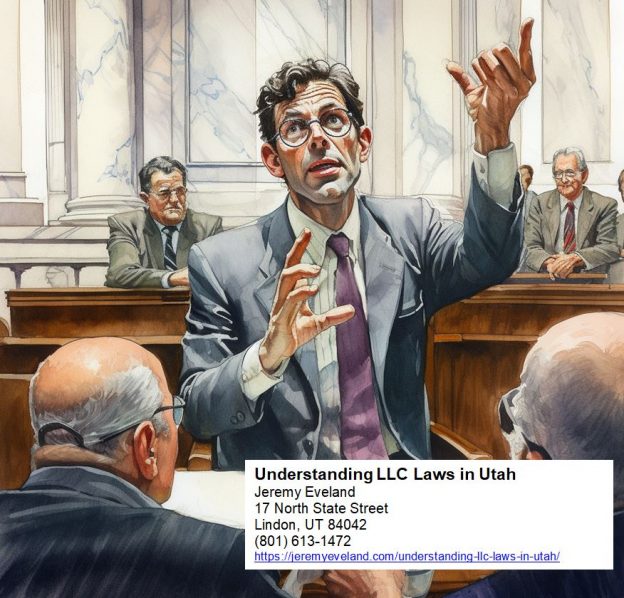-
Attorney at Law
- Introduction
- What Is Common Stock?
- Examining the Impact of Dividends on Common Stock
- Legal Definition of Common Stock
- Analyzing the Risks of Investing in Common Stock
- Exploring the Benefits of Investing in Common Stock
- When You Need A Lawyer To Transfer Common Stock
- Business Succession and Common Stock
“Grow Your Wealth with Common Stock – Invest in Your Future!”
Introduction
Common stock is a type of security that represents ownership in a company. It is the most common form of equity ownership and is typically the first type of security issued by a company. Common stockholders are entitled to vote on certain corporate matters, such as the election of directors, and receive dividends when declared by the board of directors. Common stock also provides the potential for capital appreciation, as the value of the stock can increase over time. Investing in common stock can be a great way to diversify a portfolio and potentially generate long-term returns.
What Is Common Stock?
Common stock is a type of security that represents ownership in a company. It is the most common form of equity ownership and is typically issued to the public through an initial public offering (IPO). Common stockholders are entitled to a portion of the company’s profits, as well as voting rights in certain matters.
Common stockholders are also exposed to the most risk, as they are the last to receive payments in the event of a liquidation. The value of common stock is determined by the market, and can fluctuate significantly depending on the company’s performance.
Common stock is an important source of capital for companies, as it allows them to raise funds without taking on debt. It also provides an incentive for investors, as they can benefit from the company’s success through dividends and capital appreciation.
Overall, common stock is a popular form of equity ownership that provides investors with the potential for returns, as well as voting rights in certain matters. It is an important source of capital for companies, and can be a great way for investors to diversify their portfolios.
Examining the Impact of Dividends on Common Stock
The impact of dividends on common stock is an important consideration for investors. Dividends are payments made by a company to its shareholders, usually in the form of cash or stock. Dividends can have a significant impact on the value of a company’s common stock, as they can affect the return on investment for shareholders.
When a company pays dividends, it reduces the amount of cash available to the company for reinvestment or other uses. This can have a negative impact on the company’s growth potential, as the company may not be able to invest in new projects or expand its operations. Additionally, the company’s stock price may be affected by the dividend payments, as investors may view the company as less attractive if it is not reinvesting its profits.
On the other hand, dividends can also have a positive impact on a company’s stock price. Dividends can provide a steady stream of income for shareholders, which can make the stock more attractive to investors. Additionally, dividends can signal to investors that the company is financially sound and has a strong outlook for the future. This can lead to increased demand for the stock, which can drive up the price.
Overall, the impact of dividends on common stock can be both positive and negative. Investors should carefully consider the potential effects of dividends before investing in a company’s stock. By understanding the potential impacts of dividends, investors can make more informed decisions about their investments.
Legal Definition of Common Stock
Common stock is a type of security that represents ownership in a corporation. It is the most common form of corporate ownership and is typically issued to the public through an initial public offering (IPO). Common stockholders are typically entitled to vote on matters of corporate policy, such as the election of directors and other major decisions. They also have the right to receive dividends, if declared, and to share in the proceeds of a liquidation. Common stockholders are usually last in line to receive payments in the event of a bankruptcy or liquidation.
The Dictionary of Legal Terms on page 83 defines common stock as “a security representing an ownership interest in a corporation. Ownership may also be shared with preferred stock, which has prior claim on any dividends to be paid and, in the event of liquidation, prior claim to the distribution of the corporation’s assets. As owners of the corporation, common stockholders (shareholders) assume the primary risk if business is poor, realize the greater return in the event of success and elect the board of directors that controls the company.” See Dictionary of Legal Terms, A Simplified Guide to the Language of Law, Third Edition by Steven H. Gifis, Former Associate Professor of Law, Ruters University School of Law/Newark, Barron’s.
Black’s Legal Dictionary indicates under the term “common stock” to go to the entry on “stock” which states as follows: “stock, n. 1. The original progenitor of a family; a person from whom a family is descended
Analyzing the Risks of Investing in Common Stock
Investing in common stock can be a great way to build wealth over time, but it also carries certain risks. Before investing in common stock, it is important to understand the potential risks associated with this type of investment.
The first risk to consider is market risk. This is the risk that the stock market as a whole will decline, resulting in losses for investors. Market risk is impossible to predict and can be difficult to manage.
The second risk is liquidity risk. This is the risk that an investor will not be able to sell their shares quickly or at a fair price. This can be a problem if an investor needs to access their funds quickly.
The third risk is credit risk. This is the risk that a company will not be able to pay its debts, resulting in losses for investors. Credit risk is especially important to consider when investing in smaller companies.
The fourth risk is inflation risk. This is the risk that the value of an investment will be eroded by inflation over time. Inflation risk is especially important to consider when investing in stocks with low dividend yields.
Finally, there is the risk of fraud. This is the risk that a company may be engaging in fraudulent activities, resulting in losses for investors. It is important to do thorough research before investing in any company to ensure that it is legitimate.
By understanding the risks associated with investing in common stock, investors can make more informed decisions and potentially reduce their risk of losses.
Exploring the Benefits of Investing in Common Stock
Investing in common stock can be a great way to build wealth over time. Common stock is a type of security that represents ownership in a company. When you purchase common stock, you become a shareholder in the company and are entitled to a portion of the company’s profits and assets.
There are several benefits to investing in common stock. First, it can provide a steady stream of income. When a company pays dividends, shareholders receive a portion of the profits. This can provide a steady source of income, which can be used to supplement other investments or to pay for living expenses.
Second, common stock can provide capital appreciation. As the company’s stock price increases, so does the value of your investment. This can provide a great return on your investment over time.
Third, common stock can provide a hedge against inflation. As the cost of living increases, the value of your stock may increase as well. This can help to protect your investments from the effects of inflation.
Finally, common stock can provide diversification. By investing in different companies, you can spread out your risk and reduce the impact of any one company’s performance on your overall portfolio.
Overall, investing in common stock can be a great way to build wealth over time. It can provide a steady stream of income, capital appreciation, a hedge against inflation, and diversification. For these reasons, it is an attractive option for many investors.
When You Need A Lawyer To Transfer Common Stock
When transferring common stock, it is important to seek the advice of a lawyer. A lawyer can help ensure that the transfer is done properly and legally. They can also provide advice on the best way to structure the transfer and any potential tax implications.
The lawyer can review the documents related to the transfer, such as the stock certificate, transfer agreement, and any other relevant documents. They can also provide advice on the best way to structure the transfer, such as whether to use a trust or other entity.
The lawyer can also provide advice on the potential tax implications of the transfer. Depending on the type of transfer, there may be capital gains taxes or other taxes that need to be considered. The lawyer can help ensure that the transfer is done in a way that minimizes the tax burden.
Finally, the lawyer can provide advice on any other legal issues that may arise from the transfer. This could include issues related to corporate governance, shareholder rights, or other matters.
In summary, when transferring common stock, it is important to seek the advice of a lawyer. A lawyer can help ensure that the transfer is done properly and legally, and can provide advice on the best way to structure the transfer and any potential tax implications.
Business Succession and Common Stock
Business succession is the process of transferring ownership and management of a business from one generation to the next. It is an important process for any business, as it ensures the continuity of the business and its operations.
One of the most common methods of business succession is through the use of common stock. Common stock is a type of security that represents ownership in a company. It is the most common form of equity ownership and is typically issued to the founders of a company. When a business is passed down to the next generation, the common stock is transferred to the new owners.
Common stock provides the new owners with a number of benefits. First, it gives them a stake in the company and allows them to participate in the decision-making process. Second, it provides them with a source of income, as they are entitled to receive dividends from the company. Finally, it gives them the potential to benefit from any increase in the value of the company’s stock.
When transferring ownership of a business through common stock, it is important to ensure that the transfer is done properly. This includes ensuring that the transfer is properly documented and that all legal requirements are met. Additionally, it is important to ensure that the new owners understand their rights and responsibilities as shareholders.
Business succession is an important process for any business. By transferring ownership through common stock, the new owners can benefit from the company’s success while ensuring its continuity.
Areas We Serve
We serve individuals and businesses in the following locations:
Salt Lake City Utah
West Valley City Utah
Provo Utah
West Jordan Utah
Orem Utah
Sandy Utah
Ogden Utah
St. George Utah
Layton Utah
South Jordan Utah
Lehi Utah
Millcreek Utah
Taylorsville Utah
Logan Utah
Murray Utah
Draper Utah
Bountiful Utah
Riverton Utah
Herriman Utah
Spanish Fork Utah
Roy Utah
Pleasant Grove Utah
Kearns Utah
Tooele Utah
Cottonwood Heights Utah
Midvale Utah
Springville Utah
Eagle Mountain Utah
Cedar City Utah
Kaysville Utah
Clearfield Utah
Holladay Utah
American Fork Utah
Syracuse Utah
Saratoga Springs Utah
Magna Utah
Washington Utah
South Salt Lake Utah
Farmington Utah
Clinton Utah
North Salt Lake Utah
Payson Utah
North Ogden Utah
Brigham City Utah
Highland Utah
Centerville Utah
Hurricane Utah
South Ogden Utah
Heber Utah
West Haven Utah
Bluffdale Utah
Santaquin Utah
Smithfield Utah
Woods Cross Utah
Grantsville Utah
Lindon Utah
North Logan Utah
West Point Utah
Vernal Utah
Alpine Utah
Cedar Hills Utah
Pleasant View Utah
Mapleton Utah
Stansbury Par Utah
Washington Terrace Utah
Riverdale Utah
Hooper Utah
Tremonton Utah
Ivins Utah
Park City Utah
Price Utah
Hyrum Utah
Summit Park Utah
Salem Utah
Richfield Utah
Santa Clara Utah
Providence Utah
South Weber Utah
Vineyard Utah
Ephraim Utah
Roosevelt Utah
Farr West Utah
Plain City Utah
Nibley Utah
Enoch Utah
Harrisville Utah
Snyderville Utah
Fruit Heights Utah
Nephi Utah
White City Utah
West Bountiful Utah
Sunset Utah
Moab Utah
Midway Utah
Perry Utah
Kanab Utah
Hyde Park Utah
Silver Summit Utah
La Verkin Utah
Morgan Utah
Common Stock Lawyer Consultation
When you need help from an attorney who can help with common stock matters, call Jeremy D. Eveland, MBA, JD (801) 613-1472 for a consultation.
Jeremy Eveland
17 North State Street
Lindon UT 84042
(801) 613-1472
Related Posts
Understanding Utah’s Labor Laws
Business Lawyer North Salt Lake Utah
Product Liability Laws in Utah
Preventing Cybersecurity Breaches
Business Lawyer North Ogden Utah
Business Lawyer Brigham City Utah
Mastering Business Law: Key Essentials For Success
Business Lawyer Centerville Utah
Shareholder Agreements in Utah
Business Lawyer Hurricane Utah
Business Lawyer South Ogden Utah
Last Will and Testament Lawyer
Business Lawyer Heber City Utah
Business Lawyer Hurricane Utah
Business Lawyer West Haven Utah
Do I Need A License To Start A Business?
Business Lawyer Bluffdale Utah
Business Lawyer Santaquin Utah
Legal Implications of Cryptocurrency in Business Transactions
Business Lawyer Smithfield Utah
Structuring A Flow Through Entity
Business Lawyer Woods Cross Utah



















